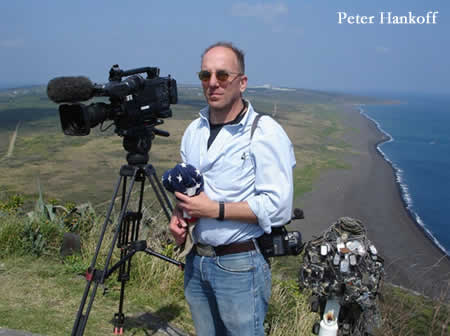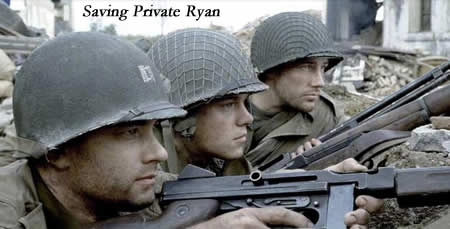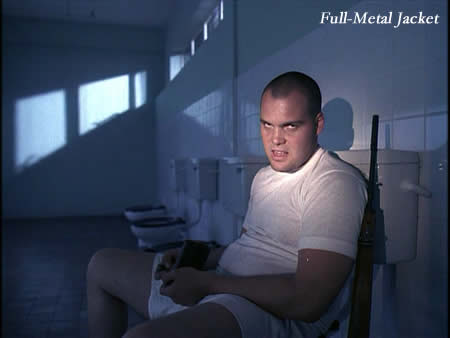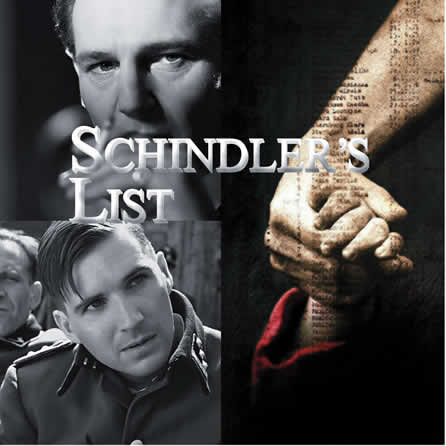 Peter Hankoff is a writer, director and producer who has spent the last ten years making documentary programs for the likes of National Geographic, History Channel and Discovery Channel. Peter began as a professional writer when he was paid $25 for an article published in Film Comment. Investing wisely, he bought more typing paper and continued writing.
Peter Hankoff is a writer, director and producer who has spent the last ten years making documentary programs for the likes of National Geographic, History Channel and Discovery Channel. Peter began as a professional writer when he was paid $25 for an article published in Film Comment. Investing wisely, he bought more typing paper and continued writing.
He has had dozens of screenplays and projects in development at the major studios and networks over the years, and he continues to write when not in production. His views on world cinema and American cinema are very interesting and come from research, study and practice.
Bijan Tehrani: Can you first tell us a little bit about your own background?
Peter Hankoff: I have been a documentary filmmaker for almost ten years, and before then I was a screenwriter for a long time in Hollywood, where I had a lot of movies get developed but none of them made. I was writing TV movies for about five years and I got one of those made, but of course now there really are no more TV movies made. I needed a job because I have a lot of experience writing dialogue. A friend of mine who was working on a documentary for a production company needed narration to be written as dialogue for the film, so he hired me to write a script about the Iron Workers in the empire state building and that got nominated for a writer’s guild award. I did not win, but it felt good to be nominated. I also was nominated for something called The Gabriel Award for Positive Family Role Models. After that, I just started making documentaries. I grew up in New York City and I have been in Los Angeles for well-over 30 years.
BT: How did you view realism throughout the history of Hollywood film-making?
PH: War is the great drama, you have the good guys and you have the bad guys, depending on how you view it. Some people die, there are explosions, and somebody has the victory. So the  concept of using war as a movie topic comes fairly natural. In particular WWII, which is a conflict that I have done a lot of movies on. I have found that the truth about a war is hidden in its minor details. They say that whoever wins the war is the one who gets to write the history. For instance, in the film Sands of Iwo Jima, I actually went to Iwo Jima just to see it before I actually saw the film to see how they handled it and, you know, it is a great dramatic movie but it is not exactly what you would call realistic. I have been face-to-face with history and met people who have lived through these events and, when you talk to them–their memories have dimmed on some levels and I’m sure there are other things that get enhanced–but when you hear their stories, there is a lot less drama and much more terror. When you look at a film like The Longest Day, you can see that many of the human elements of war are not present in the film, it is just an overkill of heroism, but the film never questions, “Where did the soldiers use the bathroom?” or “Where did they bathe?”, etc. A lot of that stuff which is not as dramatic, but it is very human.
concept of using war as a movie topic comes fairly natural. In particular WWII, which is a conflict that I have done a lot of movies on. I have found that the truth about a war is hidden in its minor details. They say that whoever wins the war is the one who gets to write the history. For instance, in the film Sands of Iwo Jima, I actually went to Iwo Jima just to see it before I actually saw the film to see how they handled it and, you know, it is a great dramatic movie but it is not exactly what you would call realistic. I have been face-to-face with history and met people who have lived through these events and, when you talk to them–their memories have dimmed on some levels and I’m sure there are other things that get enhanced–but when you hear their stories, there is a lot less drama and much more terror. When you look at a film like The Longest Day, you can see that many of the human elements of war are not present in the film, it is just an overkill of heroism, but the film never questions, “Where did the soldiers use the bathroom?” or “Where did they bathe?”, etc. A lot of that stuff which is not as dramatic, but it is very human.
BT: When look at a film like Saving Private Ryan, how do you view that film in terms of its portrayal of real events? PH: I own a copy of Saving Private Ryan, and I have watched it–particularly the opening scene–many, many times. The first time I saw it, I was awestruck, and I said that there is a something very real about this film. Then I saw that there was this excellent filmmaking and a great use of sound. I think that, from all of the footage I’ve seen and the people that I have talked to about D-day, I think that the movie was very faithful about the horror and the grittiness, especially in terms of getting on to the beach. I think you can clearly see that it is a Hollywood movie and you can see the randomness in the film. When you see a film like Saving Private Ryan, you see that it is a more realistic feeling movie than a film like The Longest Day. I think that what Hollywood has gotten a lot better at over the past few years, because of CGI, is that the equipment is more accurate. Films today have much more of a sense of authenticity; even with the flying scenes, you get the sense of the speed and the power of these airplanes. I think that all of these things do a good job of underscoring the terror of war.
PH: I own a copy of Saving Private Ryan, and I have watched it–particularly the opening scene–many, many times. The first time I saw it, I was awestruck, and I said that there is a something very real about this film. Then I saw that there was this excellent filmmaking and a great use of sound. I think that, from all of the footage I’ve seen and the people that I have talked to about D-day, I think that the movie was very faithful about the horror and the grittiness, especially in terms of getting on to the beach. I think you can clearly see that it is a Hollywood movie and you can see the randomness in the film. When you see a film like Saving Private Ryan, you see that it is a more realistic feeling movie than a film like The Longest Day. I think that what Hollywood has gotten a lot better at over the past few years, because of CGI, is that the equipment is more accurate. Films today have much more of a sense of authenticity; even with the flying scenes, you get the sense of the speed and the power of these airplanes. I think that all of these things do a good job of underscoring the terror of war.
BT: It would seem that in Hollywood, visual effects and the way things are portrayed are more important to the viewer than realistic portrayals, would you agree with this?
PH: There is sort of an interesting argument to be made about what we are looking at when we are watching a movie. If you are doing a movie about the human condition, chances are that it is going to be a smaller film, at least financially. There was a film that was made a couple of years ago about the Battle of the Bulge, about this small group of guys who were stuck behind enemy lines. It was a very small movie, but it was very powerful. It felt very dramatic with the battles; and there wasn’t a whole lot of throat cutting, so I think that Saving Private Ryan straddled the drama and action. I think that it is just the nature of movies that people want to see: there are moments of drama and then moments of pure terror, so I think that we’re kind of stuck with the idea that War is dramatic.
BT: What about some of the new war movies such as Inglorious Basterds?
PH: Well Inglorious Basterds is a very fun and very well made fantasy, only Quentin Tarantino can come up with the type of dialogue that he does, but the historical aspect of it is absolutely ridiculous. There is an element in our society that if we get rid of the voyeur aspect of war, that we can rid the dark side of war. The closest that I have ever been to war, besides visiting numerous war sites, was when I lived through the LA Riots. There was a lot of ash and you did not really know who to trust, and you just stayed inside hoping to survive. When I was kid, I was much more excited about the action aspect of the movie, but as an adult I am much more interested in the human aspect of the movie.
BT: Going back to the movie Inglorious Basterds, what I really enjoyed was the style of filmmaking, but towards the end of the film I found myself saying, “So what?”, and the film was kind of forgettable. I find that many films like that are forgotten once you leave the movie theater, would you agree with this?
PH: I am in a guild and I get a lot of screeners, so I sat down and watched Inglorious Basterds twice. Many people don’t know that the film is actually a very vague remake of an Italian Spaghetti Western of the same title. The Italian film had a completely different plot than this one, but the thing about Inglorious Basterds is that there are different kinds of good, just like how there are different kinds of bad. I think that the film was fun and this great fantasy about what it would be like to kill Hitler. I also thought that the villain was one of the better Nazi villains that I have seen.
BT: What are your opinions on the HBO series The Pacific? PH: I have been watching The Pacific religiously and this is my honest opinion on it: incredibly well done, but I find it disappointing. Where I’m disappointed is where there is this sense of context and framework that I think is missing. There are parts where they did an incredible job, but there were parts that I thought were missing. What I felt that was missing was the fact that you don’t really know where these guys are, you’re not really sure of their sense of place and they are just kind of stuck in some random battle. They did a god job of portraying war, and we see that war is frightening, grimy and harsh. Because of the fact that there are three different heroes, the story really jumps around a lot and it does not really feel cohesive.
PH: I have been watching The Pacific religiously and this is my honest opinion on it: incredibly well done, but I find it disappointing. Where I’m disappointed is where there is this sense of context and framework that I think is missing. There are parts where they did an incredible job, but there were parts that I thought were missing. What I felt that was missing was the fact that you don’t really know where these guys are, you’re not really sure of their sense of place and they are just kind of stuck in some random battle. They did a god job of portraying war, and we see that war is frightening, grimy and harsh. Because of the fact that there are three different heroes, the story really jumps around a lot and it does not really feel cohesive.
BT: What do you think about The Hurt Locker winning the Academy Award this year?
PH: I liked Hurt Locker a lot, and I have watched all of the movies that are about the war in the Middle East. When I watched the film, I wasn’t as satisfied as I thought I should be, but it was an interesting story about this guy’s addiction to war. I wish that this idea could have been stressed earlier on in the film. In the beginning you view the main character as just this guy with big balls, but they left out the complexity of it. I though that The Messenger was an interesting movie and that The Valley of Elah was an interesting movie as well; I think it is important to show these films. This war has been going on longer that WWII and it is even vaguer than WWIII.
BT: What do you think about the wave of Anti-War movies such as Full-Metal Jacket that came out after the Vietnam War?
PH: I just watched Full-Metal Jacket recently and it was a film that I have come to appreciate more now. I was a Vietnam-era person. I had a draft number, and thankfully I did not get called, so I remember the war very well. I think that society was much more polarized then, so the idea of an anti-war movie was much more accepted. I don’t think that there is a group conscious or movement today in terms of being anti-war. 
BT: What about the film The Deer Hunter?
PH: I just saw The Deer Hunter again as well, which is another movie that I love. Many people were angry when the film came out because of the Russian Roulette scenes, and they felt that those things did not happen and that they were denigrating the struggle. It seems that now, things have been re-framed that if you are critiquing war, then you are anti-troops. Today, the anti-war films are so mish-moshed in that if you are making anti-war movies, then you are against the troops–and that is just not the case.
BT: Do you think that September 11 was a wake up call for Hollywood to address issues about world affairs?
PH: One of the scariest statistics that I know is that before 9/11, between 17 and 20 percent of Americans had a passport. That shows how frightening our culture is in terms of knowing the rest of the world. I tried to represent myself as a person who is eager to travel and learn about the world and embrace myself to other cultures. When I travel as an American, I can see how contained our ideology and how little people know about the outside world. I think that there has been a little bit of improvement about how we view the Middle East. What amazes me about America and what amazes me about Hollywood is that when I travel the world, I always hear songs or music from some Hollywood movie. So we send out our culture all over the place about how we are a land of opportunity, and when they get here, they realize that if you are not American, than America can be a really scary place.
BT: The film Schindler’s List has always been a subject of controversy because some people believe it was just a melodrama. What do you think about that film?
 PH: Schindler’s List, in my opinion, is a very important movie; the issue with the film is the American sense of how you portray drama. But I have studied a lot about the Holocaust and have talked to people who lived through it. So when I see Schindler’s List, I actually feel that the horror that went on in the death camps is even far more horrible than what went on in that movie. So I feel Schindler’s List presented the audience with great accessibility to what really happened there. So when I look at the stories that I have heard and then see a movie like Schindler’s List, I see that it is not holocaust-like, such as Life is Beautiful.
PH: Schindler’s List, in my opinion, is a very important movie; the issue with the film is the American sense of how you portray drama. But I have studied a lot about the Holocaust and have talked to people who lived through it. So when I see Schindler’s List, I actually feel that the horror that went on in the death camps is even far more horrible than what went on in that movie. So I feel Schindler’s List presented the audience with great accessibility to what really happened there. So when I look at the stories that I have heard and then see a movie like Schindler’s List, I see that it is not holocaust-like, such as Life is Beautiful.
BT: What are your opinions on some foreign war movies?
PH: There were two series of movies that I was watching. I saw a series of Japanese movies that deal with Japan after the war, and I have also watched a lot of Russian movies that were set after the war. I was always curious about how a culture portrays itself and to get and idea of what the individual is. For example, when you watch a Russian movie from the 60’s, you see that in the Russian portrayal of WWII, there is a portrayal of a country on the brink of destruction. When you look at a Japanese movie, those movies tend to be about the defeated aspect of the war and that there is a camaraderie between these guys and the yearning to just get home.
BT: What steps did you take to remain faithful to the stories in terms of your own films?
PH: The networks usually make sure that you have done your homework. I have done a few jobs for National Geographic and they are really sticklers for facts. There are people that I have interviewed who have very strong opinions and, even if I don’t agree with their opinions, I feel that their opinions are important and I use them in my films. If you hand some Americans a map of the world, they could barely point out cities in the United States, so it is important to give people ideas through my films that will enable them to ask questions.
BT: What future projects do you have lined up?
PH: Right now, I am working on a two hour special about the Holocaust. In August, I am going throughout Europe to visit some of the death camps. It is about the scientific aspect and the engineering aspect of how the Holocaust was orchestrated. I am going there to do interviews and also to shoot a lot of footage of what is left In Germany, Poland, and Austria.
BT: Thanks you for your time and I wish you the best of luck and success.

